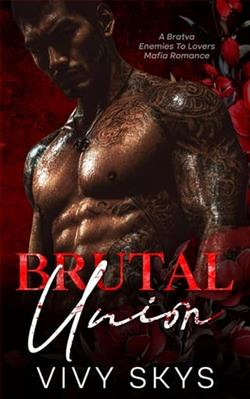Page 53 of Weave me a Rope
And so, it proved to be. When they entered the house, it was to be told the marquess had arrived, ordered a bath, and would be down for dinner.
Spen grimaced. “A bath for my countess and one for myself,” he commanded the butler. To Mr. Morris, he said, “Please let the marquess know we will be having dinner in our rooms, but I will join him for an after-dinner drink.”
Cordelia kept her head down, saying nothing. Would she agree? If not, he was sure she would let him know once they were in the privacy of their own rooms. She approved, however. “Theless time I spend with your father, the better, Spen. And if I am not present, he will not expect to see Miss Faversham.”
An hour and a half later, he went down to the dining room on his own, to find Mr. Morris cradling a brandy while his father, already well into his cups, was describing the day’s hunt in excruciating detail.
He offered Spen a jovial greeting and poured him a glass of brandy. “Married life suiting you, boy? Morris, here, says you are doing well. Learning the estates. Meeting the tenants. Reading the books. All that bull dust. Hope you’ve been plowing that wife of yours, too. Yarverton and I expect an heir as soon as possible.”
“Sir,” said Spen, “I am happy to discuss any matter you wish, except Lady Spenhurst. Someone insulted my wife this afternoon, and I punched them. I cannot punch my own father, but I will leave the room, my lord.”
For a moment, the marquess looked stunned, as if Spen had spoken gibberish. Then he burst out laughing. He clapped Spen on the back, and then Mr. Morris for good measure. “Very pretty speech, Spenhurst. But she’s just a female, when all is said and done. Not worth two men falling out over.”
“Speaking of females, my lord,” Spen said, keen to change the subject, “How is Lady Deerhaven? And how is my sister?”
The marquess made a dismissive gesture. “Lady Deerhaven is well enough. At least she has proved she can carry a brat to term. I’ll get a son on her next. Might have done so already, and if not, not for lack of trying.” His laughter invited Spen and Mr. Morris to admire his prowess. Spen took a sip of his brandy, and Mr. Morris looked as if he was trying to shrink out of sight.
“And the little girl? Does she thrive?” Spen asked. “What have you named her?”
The marquess shrugged. “Well enough, they tell me. Lady Deerhaven named her. ‘Hi’ something. The blue flower.” He shrugged again. “I didn’t see the point. What use is a daughter?”
Spen was trying to think of a blue flower that began ‘Hi’.
“Hyacinth?” Mr. Morris asked.
The marquess was pouring himself another brandy. He gave another wave of his hand. “Lady Hyacinth. Silly name.” He gulped a mouthful of the drink, and then another, staring into space as if thinking deeply. Perhaps he was considering his infant daughter. Or perhaps he wasn’t thinking at all.
Spen was wondering if he could go to bed as soon as he had finished this glass of brandy. His father was no pleasanter to be with, but at least he wasn’t being abusive or critical.
Perhaps Morris felt the pressure of the silence for he broke it with the comment, “In some cultures, children are not formally named until they are ready to take on adult responsibilities. Their mothers give them cradle names.”
The snorting noise from the marquess may have been a comment on that alien practice, but Spen rather thought his father had forgotten his audience and was lost in his own thoughts. Indeed, from the looks of the man, it might have been a snore rather than a snort. He appeared to have gone to sleep.
“I imagine little girls are given flower names in many cultures,” Spen said to the solicitor. “Yes, my lord,” Morris agreed. “I understand that to be the case.” Another glance at the marquess confirmed that he had been lulled by a conversation that bored him and was indeed asleep.
Spen and Morris chatted for a few minutes about what they hoped to achieve on this visit. Colchester Lodge had been a productive estate at one time but had been neglected, all but for the breeding kennels started by Spen’s great uncle, which had continued ever since. “The current kennel master is the great-grandson of the first kennel master,” Morris told Spen. “The family are passionate about what they do—hunting dogs, mainly. Pointers, lurchers, terriers—the estate breeds the lot. AColchester dog is certain to fetch a good price, and your sires are very much in demand to cover the dams of other breeders.”
“And the cattle?” Spen asked.
“Less so. I believe the tenants have been asking for some changes, but they have not been forthcoming. I understand from the steward the farmer who is in charge of Colchester’s herd of longhorn cattle is one of those who has requested an audience tomorrow, my lord.”
“We have a few wanting to speak to me,” Spen acknowledged.
“Yes, my lord. Will you wish to cancel them, sir?”
“Not at all,” Spen retorted.Why should he wish to canc—Ah! Of course. “I daresay my father will be hunting as many days as the hunt is out, and when he is not hunting, he will almost certainly be visiting friends or sleeping. I suggest we carry on with our plans, Morris. I suggest we see the steward first, the kennel master next, and the cattleman in the afternoon. If the day is fine enough, I could take my lady with me in whatever suitable light conveyance they have. She would enjoy an outing in a gig or the like, rather than being shut up in a carriage.”
“A good idea, Lord Spenhurst. Our lady likes to be active, now she is no longer out of sorts in the morning.”
“Out of sorts in the morning?” The marquess cracked open one eye. “Is the girl increasing, Spenhurst?”
“My wife is with child, my lord,” Spen confirmed.
The other eye flew open. “Splendid! Well done, Spenhurst. I knew if I sent you off on a tour of the properties with a warm body and no other such easy option, you’d not disappoint me. Well done. Oh, to be a young man again. Ready to bed anything, am I right?” He slapped his hand down on the table and stood to shout for a footman. “Champagne! We need a bottle of champagne!”
“Not for me, sir,” Spen insisted. “I was planning to make an early night of it.”
“Nonsense, my boy,” the marquess replied. “This is wonderful news. The future of the marquisate.” His mood darkened. “Not another damned daughter, if you please, Spenhurst. I need sons.”















